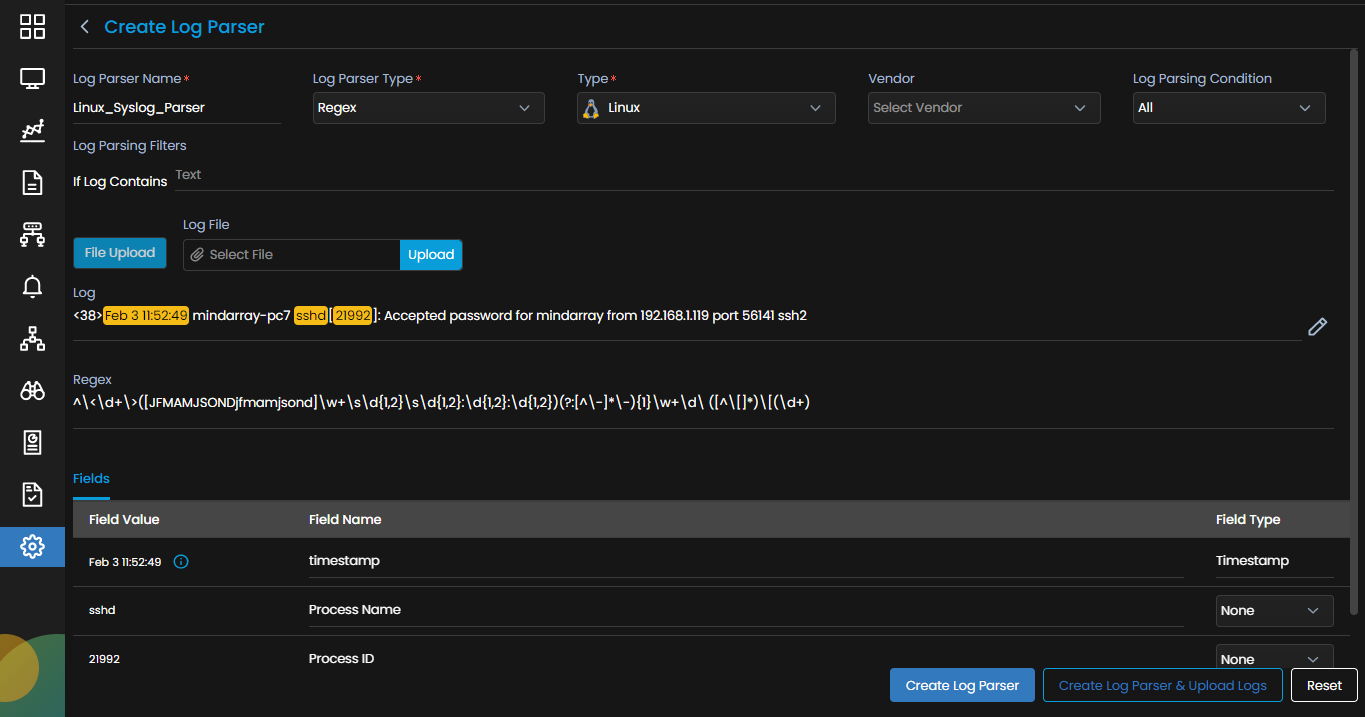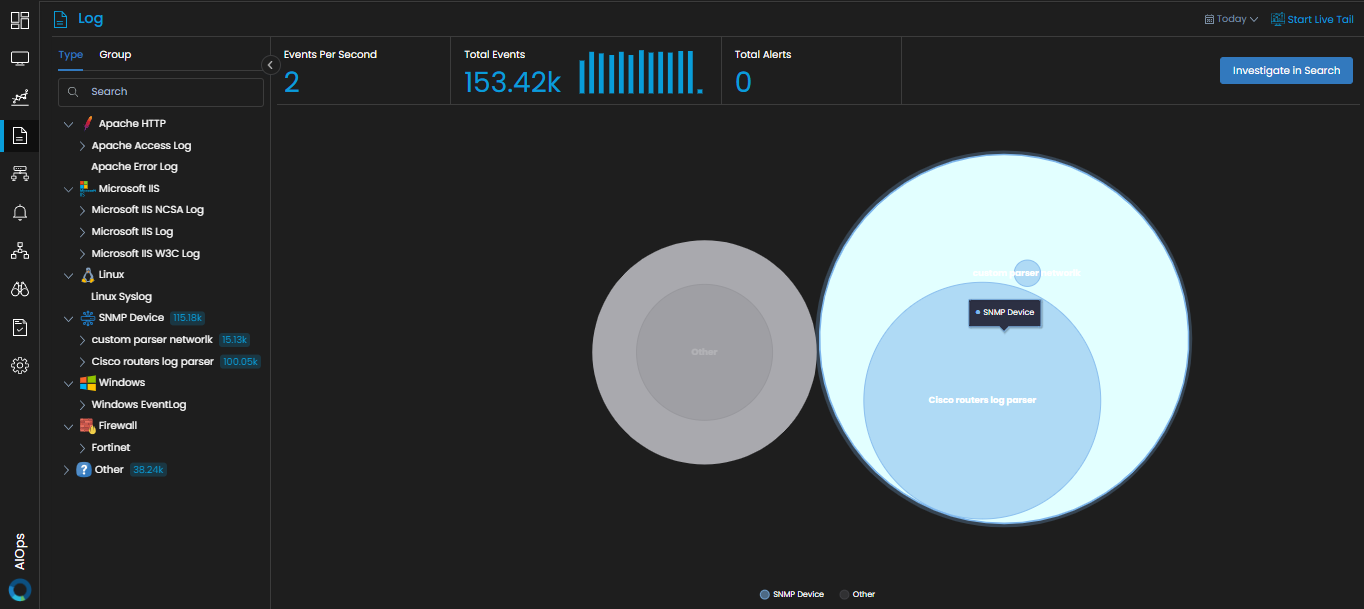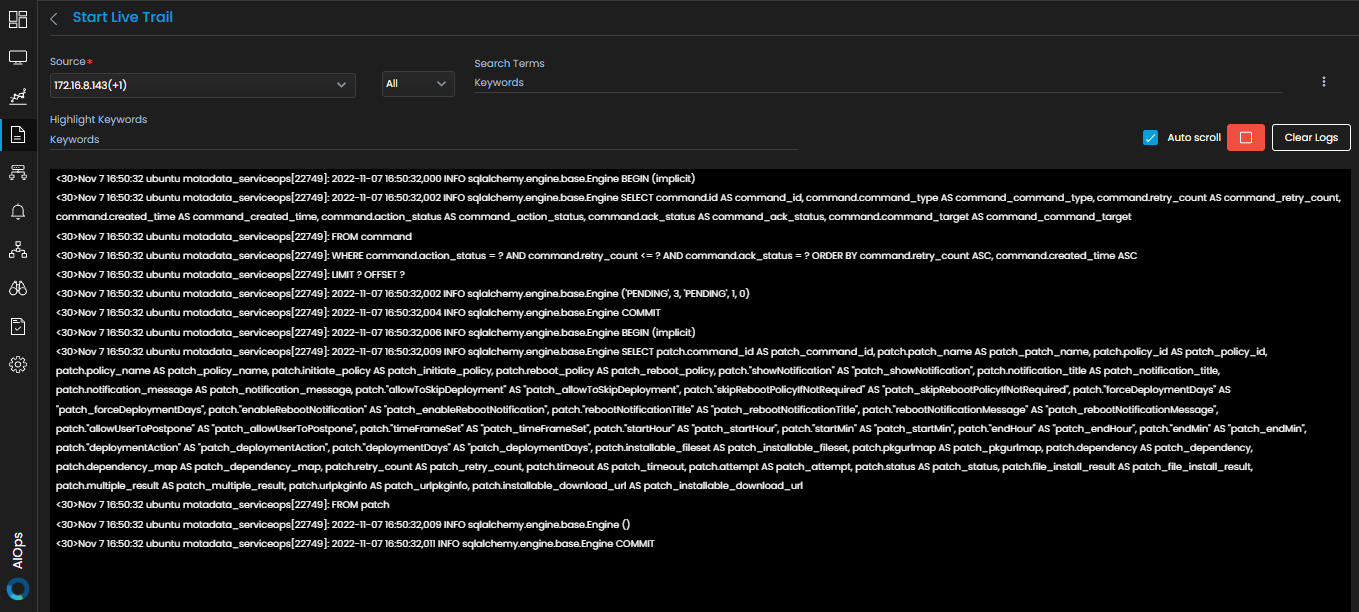What is Log Parsing?
Log parsing is the process of processing the log data to extract meaningful information from raw log data. It includes breaking down log entries into structured data that can be easily understood.
How Log Parsing Works?
Log Parsing works using pre-defined rules to process the log events in raw log data. The parsers extract meaningful information using these pre-defined rules on how to process the data and convert the logs into a structured format for easier analysis.
Here’s what you get while parsing logs with Motadata AIOps:
1. Effortless and Dynamic Log Parsing:
Motadata AIOps revolutionizes log parsing by automating the process and eliminating manual effort. Whether we are dealing with server, application, or network logs, or logs from multiple vendors, our tool ensures accurate and efficient parsing, and intelligent categorization of logs based on their type and vendor.
2. Unified Platform:
Motadata AIOps is an all-in-one platform that ingests, aggregates, parses, and manages a diverse range of logs in a centralized platform that enables easy monitoring and analyzing of log data.
3. Real-Time Insights:
Leverage immediate insights from the parsed logs, enabling faster troubleshooting and on-the-go decision-making. Real-time log parsing enables quick analysis, identifying and resolving issues, and ensuring smooth operations.
4. Improved Security Posture:
Log parsing plays a crucial role in identifying security threats. By analyzing parsed logs, Motadata AIOps can detect anomalies and potential security breaches via the inbuilt threat detection mechanism, enhancing your overall security posture.
5. Customization and Flexibility:
With Motadata AIOps, you can create customizable log parsers, allowing you to create the parsing rules to your specific environment and specific needs. You can define how to extract the fields from raw logs and how to categorize the logs. This ensures flexibility in handling diverse log formats.
6. Reduced Noise:
Focus on the log entries relevant to you by filtering out irrelevant data by applying custom parsing rules or the Out-of-the-box parsers provided in the system. This reduced noise helps you to detect critical events and trends in a more efficient manner.
7. Historical Analysis:
The parsed logs have the timestamp details of the log events thus retaining the historical context with them. This enables you to investigate events that occurred in the past, track the changes that occurred over time and identify trends of the server or application performance.
8. Log Pattern Correlation:
Motadata AIOps leverages advanced log pattern correlation techniques to identify and group together the log events that have similar patterns. This helps to convert large datasets of logs into smaller chunks of log data with similar patterns thus making the dataset concise, manageable, and insightful. This enables users to quickly identify trends, commonalities, and anomalies.
Features of Motadata AIOps Log Parsing
1. Pre-built Parsers:
Benefit from a library of pre-configured Out-of-the-box parsers for popular servers, applications, and network devices, including Microsoft, Apache, IIS, Firewall, etc., across vendors. These parsers ensure accurate log interpretation with minimal manual intervention.
2. Customizable Parsing Rules:
You can parse logs to your specific needs by creating custom parsers. This flexibility allows you to tailor log parsing to support diverse log formats and meet specific requirements at the same time.
3. Centralized Log Management:
Manage all the logs in your infrastructure from one unified platform. This makes it easier and more efficient to access, search, and analyze log data.
4. Advanced Analytics:
Utilize cutting-edge tools such as the Log Explorer to filter, search, and correlate log data. This facilitates a comprehensive analysis of log events, enabling you to identify historical trends and predict future behavior.
5. Intuitive Dashboard:
The user-friendly and easy on the eye dashboard provides a diverse range of visual representation such as Chart, Grid, Top N and more to suit your needs. This Intuitive dashboard allows quick monitoring and analysis to enable on the go troubleshooting and resolution.
6. Live Log Trail:
Leverage the Live Log Trail feature that facilitates real-time log monitoring as it allows you to view live log data as it is generated. This helps to promptly detect and address issues as they occur.
7. Proactive Alerting:
The platform support proactive alerting with both inbuilt and customizable alerting capabilities for critical log events. This would ensure that you get a hold of potential issues before they escalate.
8. Log Pattern Matching:
The platform identifies patterns and trends in log data by clustering similar logs together using machine-learning powered log pattern matching. This aids to detect trends and at the same time helps to detect the anomalies and troubleshooting issues efficiently.
9. Scalability:
With the volume of logs increasing exponentially and the infrastructure becoming more and more complex, Motadata AIOps is adept at scaling to your needs without compromising performance.
In this way, Motadata AIOps enhances your log management capabilities, providing a comprehensive solution for monitoring, analyzing, and managing log data efficiently.
Log Parsing – Best Practices
Adhere to the following best practices for log parsing to unlock a streamlined and optimized log management experience.
- Standardize Log Formats: Make sure that the logs from diverse sources follow a standard format to enable easy parsing for your log management platform.
- Update Parsers Regularly: Keep your log parsers library updated to handle changes in log formats and log sources.
- Include Timestamps: Accurate timestamps add historical context to the log events and help with identifying trends and analysing past issues.
- Centralised Log Storage: Store all your logs in a centralized repository to enable easy access, analysis, and log retention. This ensure you handle logs at one location rather than manage them across multiple locations.
- Establish clear logging objectives: Identify how you want the logs to be parsed according to your business goals.
- Log Messages: Ensure the log messages are meaningful.
Future of Log Parsing: What’s on the Horizon?
With the log data growing exponentially both in volume and complexity, the future of log parsing is bound to be transformed through emerging technologies such as Machine Learning (ML), Artificial Intelligence (AI), and big analytics. These technologies help to make log parsing more efficient and intelligent, enabling not only quick parsing but faster detection of trends and anomalies in log events without a lot of manual effort.
The growing trend towards cloud-based solutions also extends to log parsing, with more users opting for cloud-native log management tools as they offer a more scalable and cost-effective option for handling large volumes of data at the same time they also reduce the need for on premise infrastructure.




